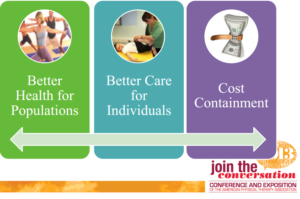
Standing room only at the APTA 2013 Conference
It was a packed house for an excellent session on Innovative Care models at the American Physical Therapy association annual conference in Salt Lake City last week. Any of the 5 presenters could have held their own for the entire session. Together, they provided a powerhouse of enthusiasm, ideas, and motivation to change healthcare practice.
A common theme across all the presenters was that the time is now right for the types of innovative programs they were espousing. Many commented on how they are seeing a lot more acceptance of new ideas and new models of care than when they first embarked on this path. Another common theme was that the data doesn’t lie. Healthcare is in crisis due to the declining health of the American public. Our favorite quote of the session was from Mike Eisenhart from Pro-activity who said “Chronic disease is simply the accumulation of years of bad behavior.” Sad but true that most chronic disease in the United States is entirely preventable. Each presenter showed saddening statistics that supported this view.
Karen Kemmis kicked off the session by reviewing the triple aim of healthcare reform developed by the Institute for Healthcare Improvement:
She also described changes that are making new care models possible including:
- Integrated care models, like Accountable Care Organizations
- Expansion in coverage
- Changing payment mechanisms
- Outcome and quality based payments
- Program integrity
Next up was Jennifer Gamboa, founder and President of Body Dynamics, Inc – a multi-disciplinary physical therapy and wellness center in Falls Church, Virginia. Dr. Gamboa outlined their consistent and unique approach to treating clients, where each healthcare professional applies the same rigorous screening process to access overall health and wellness. This approach recognized that clients choose their treatments, for example, many lower back-pain patients see a registered massage therapist first although they might be better helped by a physical therapist. Rather than bemoaning the lack of consumer awareness, Body Dynamics works with the consumer to access overall health and willingness to change regardless of how they found the clinic. It was a refreshing approach that creates a health team that includes a physical therapist, nutritionist, massage therapist, personal trainer, and counselor, and screens patients based on their movement quality, disease risk factors, fitness, and willingness to change. Body Dynamics is incubating the process now, so Dr Gamboa was not able to share outcomes or recommend how others might use her methodology yet but this is definitely a development to watch.
Jennifer was followed by Margaret O’Neil from Drexel University, who talked about health promotion strategies for children and their caregivers. Dr. O’Neil stressed the importance of motivational interviewing to support behavior change. Motivational interviewing includes expressing empathy, supporting self-efficicacy, accepting resistance, and avoiding argumentation. Open questions and active listening are tools in motivational interviewing. The point of the process is to determine where someone is in their willingness to change, and therefore, the type of intervention that is appropriate. Interventions might need to be psychological before physical. As well, the entire family needs to be involved and parents need to model healthy eating and activity. Dr. O’Neil mentioned that parents often believe that being overweight is inevitable, using the excuse “we’re just a big-boned family.”
Next up was Mike Eisenhart from Pro-Activity, who was the most provocative and tweetable (hashtag #apta2013) of the group. He graduated as a physical therapist and immediately stopped calling himself one because he was told that physical therapists could only treat problems not help prevent them. Instead, Mike built a business around wellness and prevention, specifically in the workplace and now helps to manage the health of over 20,000 people. Pro-Activity provides health assessments and helps employees manage change, resulting in lower insurance costs for employers. Mike is really happy that he’s starting to see other physical therapists take proactive roles in health and wellness.
The final presenter was Cheryl Resnik who quipped that you should find out how funny the other presenters are before agreeing to a panel. She didn’t need to worry, as the story of the USC Fit Families program was extremely compelling. The program, which provides exercise programs and a free physical therapy clinic to low-income families, is located near USC campus in a neighborhood known for a gang with ties to the Mexican mafia and that is a “food desert”. A food desert is defined as an area where it is not possible to buy fresh food. Fast food is often the only or definitely the cheapest option. Resnik recounts needing to buy a scale that measured up to 1,000 pounds to weigh some of her participants, who were mostly teenagers! Fit Families provides individualized and group exercise programs, nutrition counselling, and assessments. It’s funded by grants and volunteer physical therapy students from USC. Students become so engaged in the program they often continue volunteering after they’ve received their credits.
This was one of the best sessions we attended at American Physical Therapy Conference in Salt Lake City. It was amazing to see so many people focused on prevention and wellness both in for-profit and not-for-profit scenarios. At the end of the session, Margaret O’Neil asked the audience how many were inspired to try their own programs, and a number of people who reported previously being discouraged said they were ready to give it a go. We can’t wait!







